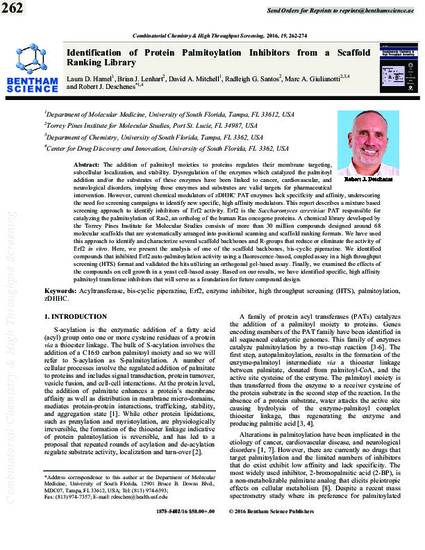
- Acyltransferase,
- bis-cyclic piperazine,
- Erf2,
- enzyme inhibitor,
- high throughput screening (HTS),
- palmitoylation,
- zDHHC
The addition of palmitoyl moieties to proteins regulates their membrane targeting, subcellular localization, and stability. Dysregulation of the enzymes which catalyzed the palmitoyl addition and/or the substrates of these enzymes have been linked to cancer, cardiovascular, and neurological disorders, implying these enzymes and substrates are valid targets for pharmaceutical intervention. However, current chemical modulators of zDHHC PAT enzymes lack specificity and affinity, underscoring the need for screening campaigns to identify new specific, high affinity modulators. This report describes a mixture based screening approach to identify inhibitors of Erf2 activity. Erf2 is the Saccharomyces cerevisiae PAT responsible for catalyzing the palmitoylation of Ras2, an ortholog of the human Ras oncogene proteins. A chemical library developed by the Torrey Pines Institute for Molecular Studies consists of more than 30 million compounds designed around 68 molecular scaffolds that are systematically arranged into positional scanning and scaffold ranking formats. We have used this approach to identify and characterize several scaffold backbones and R-groups that reduce or eliminate the activity of Erf2 in vitro. Here, we present the analysis of one of the scaffold backbones, bis-cyclic piperazine. We identified compounds that inhibited Erf2 auto-palmitoylation activity using a fluorescence-based, coupled assay in a high throughput screening (HTS) format and validated the hits utilizing an orthogonal gel-based assay. Finally, we examined the effects of the compounds on cell growth in a yeast cell-based assay. Based on our results, we have identified specific, high affinity palmitoyl transferase inhibitors that will serve as a foundation for future compound design.
Available at: http://works.bepress.com/radleigh-santos/20/
